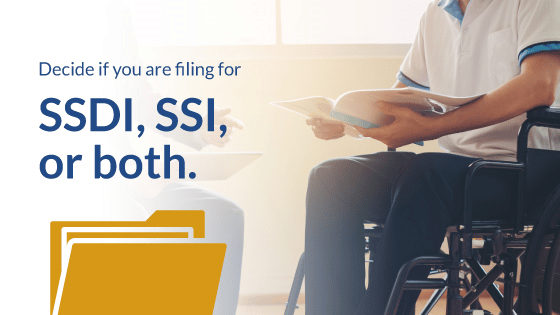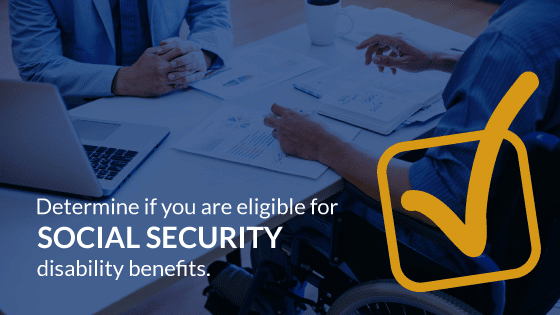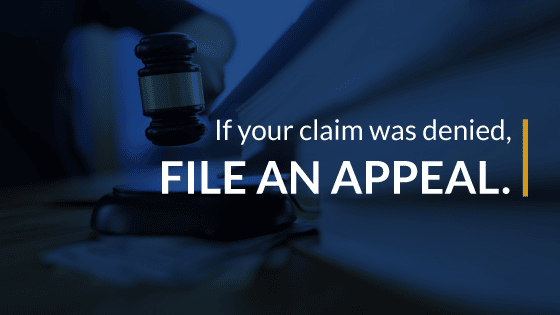If you are unable to work due to a disability, you may qualify for Social Security disability benefits. Below, we break down the steps that you’ll need to take to file a claim for benefits.
Quickly find the Social Security Benefits Application asnwers you need:
- Decide if you are filing for SSDI, SSI, or both
- How to Determine if you are eligible for Social Security disability benefits in NJ
- Do You Qualify for Disability Quiz
- Five-Step Sequential Process
- What Information Do I Need to Support an SSDI Claim in NJ
- Where Do I File My SSDI Claim?
- When will I receive a response from the SSA on my SSDI application?
- What do I do if my SSDI claim is denied?
- What Conditions are Considered for Disability?
- How Long Does It Take to Get Approved for Social Security Disability?
- How Much Does Social Security Disability Pay a Month?
- How to File for Social Security Disability

Decide if you are filing for SSDI, SSI, or both
There are two types of disability programs available through the Social Security Administration (SSA): Social Security Disability Insurance (SSDI) and Supplemental Security Income (SSI). Both types of benefits require that you be disabled, as defined by federal law.
However, to qualify for SSDI, you must have earned work credits by working for a certain amount of time and paying Social Security taxes. You don’t need work credits to apply for SSI, but you will need to prove that you have limited income and resources. Some people may qualify for both SSDI and SSI, or just one type of disability benefit.

How to Determine if you are eligible for Social Security disability benefits in NJ
To qualify for SSDI or SSI, you must first prove that you are disabled. Generally, a person may be considered disabled if they are unable to work due to a long-term disability.
Do You Qualify For Disability Quiz
Five-Step Sequential Process
The SSA uses a five-step sequential process to decide if a person is disabled:
- If you are working, you cannot earn more than an average of $1,690 per month (known as substantial gainful employment). If you are not working, then the SSA’s Disability Determination Services (DDS) will decide your condition;
- Your impairment or combination of impairments must significantly limit your ability to perform basic work, and must be expected to last for a year or longer or to result in death;
- Your impairment must meet or exceed all of the requirements on the SSA’s Listing of Impairments, or it must have other factors that equal a medical condition on the list;
- If your impairment does not meet this criterion, then it must prevent you from performing any of your past work; and
- You must not be able to do any other type of work, based on your impairment, age, education, past work experience, and any transferable skills.
If the SSA determines that you are disabled, then you may qualify for SSDI and/or SSI benefits.

What Information Do I Need to Support an SSDI Claim in NJ
If you believe that you are eligible, the next step is to file a disability application. To do so, you will need supporting documentation. This may include items such as:
- Your birth certificate, Social Security Number, and proof of citizenship or lawful status;
- Work history, including pay stubs
- Information on any recent work
- Contact information for any treating medical professionals, including doctors, therapists, and hospitals;
- A list of the medication that you currently take;
- Medical records that you have in your possession; and/or
- An adult disability report.

Where Do I File My SSDI Claim?
Once you have gathered the required documentation, the next step is to fill out the forms to file a disability claim. The SSA allows you to file a claim online, over the phone (toll-free: 1-800-772-1213, or TTY 1-800-325-0778), or at a local Social Security field office.
Your completed application will be processed through a local Social Security office and a state of New Jersey agency (DDS), which will determine whether you are disabled under SSA standards.

When will I receive a response from the SSA on my SSDI application?
After you file your disability application with the SSA, you will typically get a response within 3 to 5 months. It may take more or less time to get a decision depending on the specific facts of your case and how quickly the SSA can get access to medical evidence for your application. If your claim is approved, then you will start to receive monthly payments from the SSA.

What do I do if my SSDI claim is denied?
Most initial applications for disability benefits are denied by the SSA. If your application was denied, then you can choose to file an appeal. There are four levels of appeal:
- Request for Reconsideration;
- Request a hearing before an administrative law judge (ALJ);
- Request review by the SSA Appeals Council; and
- File a lawsuit in federal court.
In most cases, you have 60 days after receiving notice of a decision by the SSA to file an appeal.
What Conditions Are Considered for Disability?
The SSA considers both mental health and medical conditions when evaluating applications for SSDI and/or SSI benefits. The Listing of Impairments contains fourteen broad categories of disabilities: musculoskeletal disorders, special senses and speech, respiratory disorders, cardiovascular system, digestive system, genitourinary disorders, hematological disorders, skin disorders, endocrine disorders, congenital disorders that affect multiple body systems, neurological disorders, mental disorders, cancer (malignant neoplastic diseases), and immune system disorders. Each category contains a number of impairments.
If you have a question about whether your condition meets or exceeds a condition on the Listing of Impairments, reach out to a Social Security disability benefits lawyer for a free consultation.
How Long Does It Take to Get Approved for Social Security Disability?
According to the SSA, an initial decision on a disability application is usually made within 3 to 5 months. However, if your initial application is denied and you appeal the denial, it could take much longer to receive a final determination. Because many denials of disability applications are for technical rather than medical reasons, it may make sense to work with a New Jersey Social Security disability attorney to help you gather information and file an online application.
How Much Does Social Security Disability Pay a Month?
The monthly benefit amount for SSDI varies based on your lifetime average earnings before you became disabled. In 2026, SSI benefits are capped at a maximum of $994 per month for an eligible individual, $1,491 for an eligible couple, and $498 for an essential person.
How To File for Social Security
There are 6 basic steps that you will need to follow to file for Social Security disability. Contact a NJ disability lawyer at Bross & Frankel for a free claim review.
1. Decide if you are filing for SSDI, SSI, or both.
There are two types of disability programs available through the Social Security Administration (SSA): Social Security Disability Insurance (SSDI) and Supplemental Security Income (SSI). Both types of benefits require that you be disabled, as defined by federal law.
However, to qualify for SSDI, you must have earned work credits by working for a certain amount of time and paying Social Security taxes. You don’t need work credits to apply for SSI, but you will need to prove that you have limited income and resources. Some people may qualify for both SSDI and SSI, or just one type of disability benefit.
2. Determine if you are eligible for Social Security disability benefits in NJ.
To qualify for SSDI or SSI, you must first prove that you are disabled. Generally, a person may be considered disabled if they are unable to work due to a long-term disability.
The SSA uses a five-step sequential process to decide if a person is disabled:
– If you are working, you cannot earn more than an average of $1,690 per month (known as substantial gainful employment). If you are not working, then the SSA’s Disability Determination Services (DDS) will decide your condition;
– Your impairment or combination of impairments must significantly limit your ability to perform basic work, and must be expected to last for a year or longer or to result in death;
– Your impairment must meet or exceed all of the requirements on the SSA’s Listing of Impairments, or it must have other factors that equal a medical condition on the list;
– If your impairment does not meet this criterion, then it must prevent you from performing any of your past work; and
– You must not be able to do any other type of work, based on your impairment, age, education, past work experience, and any transferable skills.
If the SSA determines that you are disabled, then you may qualify for SSDI and/or SSI benefits.
3. Gather information to support your SSDI claim.
If you believe that you are eligible, the next step is to file a disability application. To do so, you will need supporting documentation. This may include items such as:
– Your birth certificate, Social Security Number, and proof of citizenship or lawful status;
– Work history, including pay stubs;
– Information on any recent work;
– Contact information for any treating medical professionals, including doctors, therapists, and hospitals;
– A list of the medication that you currently take;
– Medical records that you have in your possession; and/or
– An adult disability report.
4. File your SSDI claim.
Once you have gathered the required documentation, the next step is to fill out the forms to file a disability claim. The SSA allows you to file a claim online, over the phone (toll-free: 1-800-772-1213, or TTY 1-800-325-0778), or at a local Social Security field office.
Your completed application will be processed through a local Social Security office and a state of New Jersey agency (DDS), which will determine whether you are disabled under SSA standards.
5. Wait for a response from the SSA
After you file your disability application with the SSA, you will typically get a response within 3 to 5 months. It may take more or less time to get a decision depending on the specific facts of your case and how quickly the SSA can get access to medical evidence for your application. If your claim is approved, then you will start to receive monthly payments from the SSA.
6. If your claim is denied, file an appeal.
Most initial applications for disability benefits are denied by the SSA. If your application was denied, then you can choose to file an appeal. There are four levels of appeal:
– Request for Reconsideration;
– Request a hearing before an administrative law judge (ALJ);
– Request review by the SSA Appeals Council; and
– File a lawsuit in federal court.
In most cases, you have 60 days after receiving notice of a decision by the SSA to file an appeal.
Confused By These Steps? Reach Out to a New Jersey Disability Lawyer Today.
The process of applying for Social Security disability benefits can be daunting. Although there are just six steps, each step requires understanding complicated legal standards and/or a fair amount of work. If you are unsure about your eligibility for SSDI or SSI benefits, or simply need help putting together a disability claim, Bross & Frankel can help.
Based in Cherry Hill, NJ, our law firm represents people with disabilities throughout New Jersey in the disability application and appeal process. With decades of combined experience, including as a Benefit Authorizer for the SSA, our team of SSDI Lawyers and SSI Lawyers is well-positioned to help you be approved for SSDI and/or SSI benefits. To learn more or to schedule a free claim review with a New Jersey Social Security disability lawyer, give us a call at 856-795-8880 or fill out our online contact form.